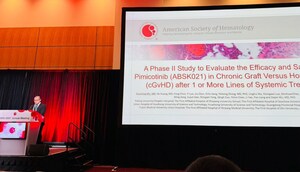Abbisko Therapeutics Announces that U.S. FDA Has Granted Fast Track Designation for Its CSF-1R Inhibitor Pimicotinib (ABSK021)
SHANGHAI, Dec. 13, 2023 /PRNewswire/ -- Abbisko Therapeutics Co., Ltd. ("Abbisko Therapeutics") today announced that its CSF-1R inhibitor pimicotinib (ABSK021) has been granted the fast track designation ("FTD") by the U.S. FDA for the treatment of tenosynovial giant cell tumor ("TGCT") patients that are not amenable to surgery. Previously, pimicotinib was granted the breakthrough therapy designation ("BTD") by the U.S. FDA for TGCT in January, 2023. The grant of FTD and BTD will accelerate the global development and commercialization of pimicotinib.
Fast Track is a policy designed to facilitate the development and expedite the review of drugs in order to treat serious conditions and fulfill unmet medical needs. Its purpose is to get important new drugs to patients earlier. Moreover, the FTD enables companies to maintain more frequent communications and meetings with the U.S. FDA. The drug also becomes eligible for accelerated approval and priority review by the U.S. FDA.
In early December, Abbisko entered into an agreement with Merck KGaA, Darmstadt, Germany that grants it the exclusive license to commercialize pimicotinib for all indications in China mainland, Hong Kong, Macau, and Taiwan. Merck KGaA, Darmstadt, Germany also obtained an exclusive option for global commercial rights of pimicotinib, subject to the terms and conditions as agreed between the parties. Pursuant to the terms of the License Agreement, Abbisko will receive a one-time, non-refundable down payment of US$ 70 million. In the event that Merck KGaA, Darmstadt, Germany exercises the global commercialization option, Merck KGaA, Darmstadt, Germany will pay Abbisko an additional option exercising fee. The aggregate amounts of upfront payment, option exercising payment, and payment for development and commercialization milestones will total US$ 605.5 million. Abbisko will also obtain from Merck KGaA, Darmstadt, Germany double-digit percentage (%) royalties based on actual annual net sales.
Pimicotinib is a novel, orally available, highly selective, and potent small molecule CSF-1R inhibitor, independently developed by Abbisko Therapeutics. It has been granted the BTD and Priority Medicine (PRIME) designation by China NMPA, U.S. FDA, and EMA for the treatment of TGCT patients that are not amenable to surgery. The study is the first global Phase III clinical trial of TGCT conducted simultaneously in China, the U.S., Canada and Europe.
Upon 1-year follow-up in a Phase 1b trial for TGCT, pimicotinib demonstrated an ORR of 87.5% (28/32, including 3 CR) in the 50 mg QD cohort, which was presented at the 2023 CTOS. A Phase I dose-escalation trial for pimicotinib has been completed in the U.S. previously.
In addition to TGCT, Abbisko is actively exploring the potential of pimicotinib in treating other indications including many types of solid tumors in clinic, and it has obtained approval from NMPA to conduct a Phase II clinical study in chronic graft-versus-host disease and advanced pancreatic cancer. Up until today, no highly selective CSF-1R inhibitors have been approved in China.
About TGCT
TGCT is a locally aggressive neoplasm that usually affects synovial joints, mucous sacs, and tendon membranes, resulting in swelling, pain, stiffness, and decreased activity of the affected joints, which seriously affects the patient's quality of life [1]. According to the 2013 World Health Organization classification, TGCTs were classified as localized TGCT and diffuse TGCT. Diffuse TGCT encompasses formerly known nodular tenosynovitis and pigmented villonodular synovitis ("PVNS"). Overexpression of CSF-1 occurs in most TGCTs. Surgical resection is the standard treatment for TGCT. However, not all patients are suitable for surgical treatment. It is difficult to remove tumors of diffuse TGCT patients by surgery, which may possibly lead to severe joint damage, total synovectomy, joint replacement, or even amputation, and the risk of surgical complications can be high. It has been reported that more than 50% of patients with diffuse TGCT would undergo recurrence after surgical resection [2]. For TGCT patients who are not amenable to surgery, there is currently no approved drug available in China.
[1] Stacchiotti S, Dürr HR, Schaefer IM, et al. Best clinical management of tenosynovial giant cell tumour ("TGCT"): A consensus paper from the community of experts. Cancer Treat Rev. 2023;112:102491. |
[2] Verspoor FG, van der Geest IC, Vegt E, Veth RP, van der Graaf WT, Schreuder HW. Pigmented villonodular synovitis: current concepts about diagnosis and management. FutureOncol. 2013;9(10):1515-1531. |
SOURCE Abbisko

WANT YOUR COMPANY'S NEWS FEATURED ON PRNEWSWIRE.COM?
Newsrooms &
Influencers
Digital Media
Outlets
Journalists
Opted In





Share this article